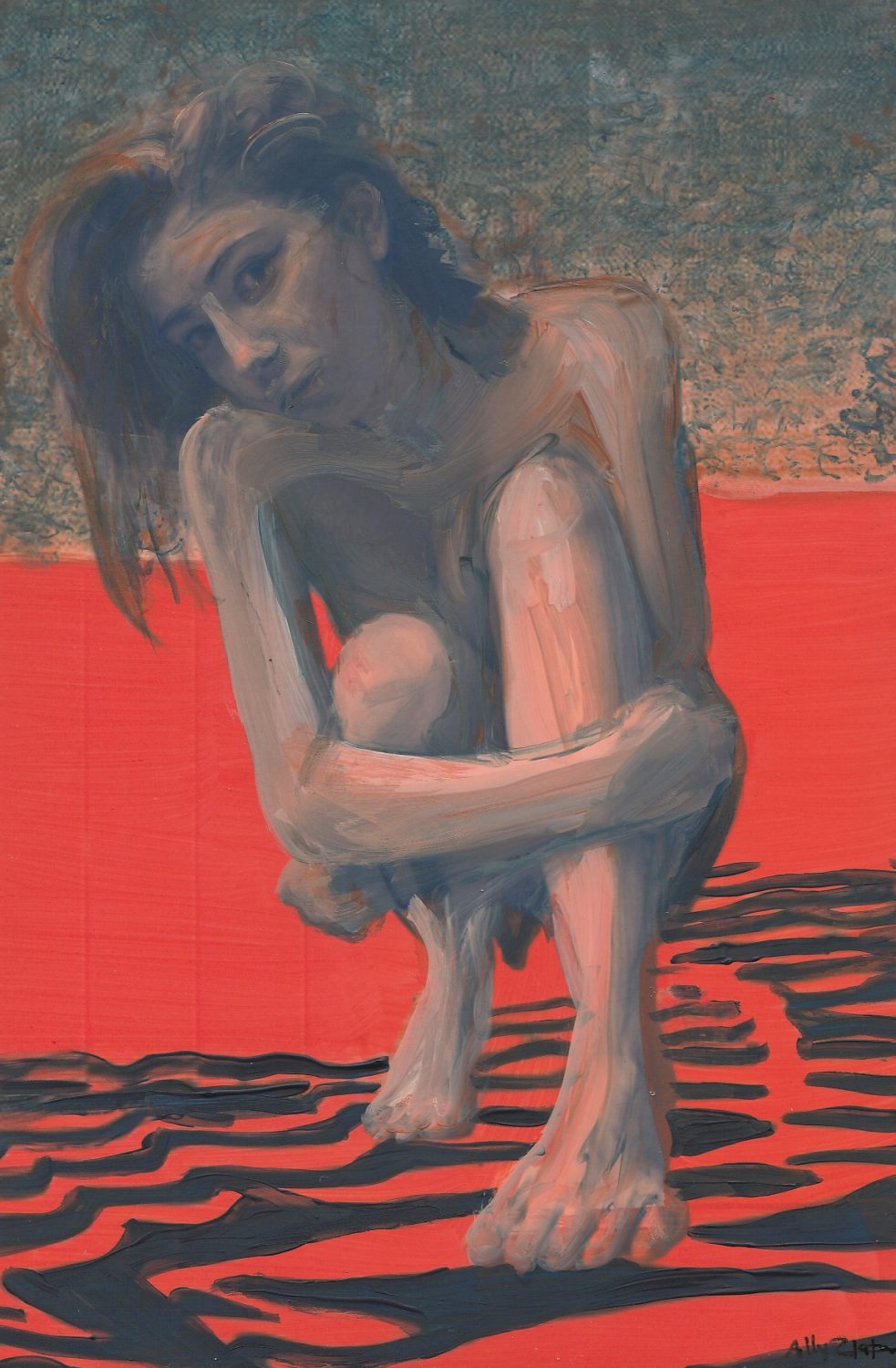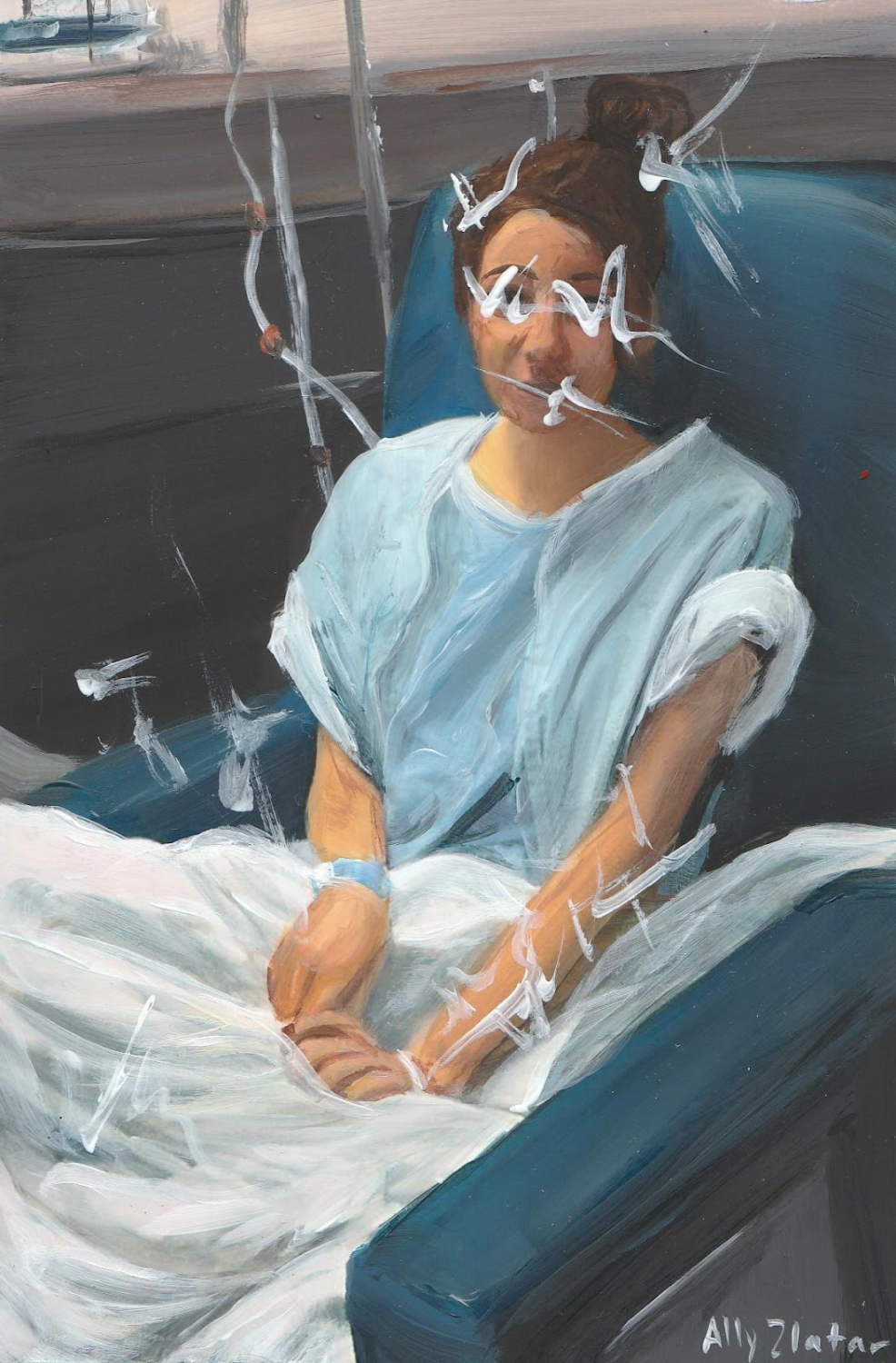A Case Study by “The Starving Artist”
The transformative power of art in the context of healthcare reform is vividly exemplified through the poignant case study of “The Starving Artist” and the artist behind this powerful journey, Ally Zlatar. Ally Zlatar’s journey as an artist living with a severe eating disorder for over 10 years has been both deeply personal and transformative. Her experience as an unwell artist served as the crucible that eventually gave birth to “The Starving Artist.” Ally embarked on a path of vulnerability, delving into the very core of her lived experience with this debilitating mental health condition. Growing up, Ally found that her family did not speak about mental health, and medical practitioners tended to view her through the lens of a diagnosis, missing the depth of her struggles. This lack of understanding and support from her immediate environment fueled her determination to shed light on the hidden world of eating disorders and the mental and emotional turmoil they bring.

Trigger Warning: This text contains references to lived experience of eating disorders.

At first, Ally believed that her approach was simply a trope of the quintessential artist, dramatizing her existence, as suggested by Erving Goffman. However, as she delved deeper into her paintings and artist book publications, she realized that each artwork authentically captured an in-the-moment experience. This journey of self-exploration unveiled a disconcerting truth – Ally’s struggle with her eating disorder remained a recurring theme in her art. The underlying thought that “I may never get better” echoed throughout her artistic creations, a reflection of the relentless grip of the ravenous illness.
Ally’s art became not only a channel for her personal struggles but a means to engage in a broader social dialogue. Her art was a poignant manifestation of the harsh reality of living with an eating disorder, far more severe and destructive than it initially appeared. Ally’s artistic insights aim to provide a lifeline for other artists grappling with eating disorders, encouraging them to engage critically with their experiences and vulnerably share them through their artworks. This authentic engagement within the realm of reflective practice can resonate profoundly with wider audiences and potentially shape a more empathetic society. Autoethnographic research and insights drawn from interviews with fellow artists serve as a testament to the crucial role of art in authentically portraying the experiences of those with eating disorders and challenging deep-rooted societal misconceptions.
Alexandria Zlatar, Worshipping the Porcelain Throne, Acrylic, 2022.
Ally’s commitment to authenticity compelled her to be candid and transparent in sharing her daily battles with the disorder. She utilized various artistic mediums to express her experiences and challenges. The emergence of “The Starving Artist” as an organization dedicated to raising awareness about eating disorders and mental health was the culmination of her journey. Through her creative work and advocacy, Ally sought to transform her own pain into a force for positive change, creating a platform for dialogue, understanding, and healing. With over 20+ exhibitions, working with over 2000+ emerging artists in 30+ countries her work has made a lasting impact. Ally Zlatar has received the highest accolade a young person can achieve for their humanitarian work; winner of The Princess Diana Legacy Award 2021, King Hamad Award for Youth Empowerment 2022, Lieutenant Governor’s Community Volunteer Award from Ontario Government of Canada 2023 and also a special recognition from The British Citizen Award 2022.
One of the central recommendations that emerges from this research emphasizes the urgent need to place lived experiences at the forefront of medical conversations. By elevating the inclusion of personal experiences, we can actively challenge and dismantle prevailing biases and stereotypes that have long hindered a comprehensive and empathetic understanding of eating disorders. In this context, art emerges as a powerful tool bridging the chasm between individual experiences and the broader discourse on mental health. Furthermore, another pivotal recommendation revolves around the imperative of providing more authentic and diverse representations of eating disorders in the media and social spheres. Stereotypical portrayals in the media have perpetuated limiting stereotypes, thus constraining our collective understanding of these disorders and perpetuating harmful stigmas. In response, it is essential that both social media platforms and mainstream media outlets actively promote non-binary discourse and embrace diverse identity formations. Such a shift can empower individuals to challenge and reshape traditional perceptions, particularly those related to the suppressed female body.
Still from Journeys Festival Installation, Manchester, Photography of Installation, 2021, Artwork by: Alexandria Zlatar, Image Credit: Drew Forsyth Photography.
The Starving Artist underscores the central role that art plays in unraveling the intricacies of eating disorders. It posits that galleries, museums, and arts programming should be proactive advocates for these disorders, offering platforms for open and meaningful discussions. Art, as an activist tool, possesses the remarkable capacity to foster a deep comprehension of mental health issues, thereby engendering empathy. It is a shared responsibility between the arts community and medical institutions to establish a much-needed “safe space” for conversations surrounding eating disorders. By recognizing and embracing the diversity of experiences and struggles, they can create an environment conducive to healing and mutual understanding.
The Starving Artist endeavor aspires to have a profound impact on the comprehension and dissemination of the challenges encountered by individuals on their personal journeys. At its core, it seeks to establish and nurture networks that empower artists and individuals to navigate and articulate their lived experiences, transcending cultural barriers, including language, education, and resource availability. Art has proven itself to be a potent instrument for advocating for and amplifying these lived experiences, offering avenues for expression, delving into personal well-being, and transcending systemic barriers.
Art is instrumental in advocacy, giving voice to the lived experiences that often remain hidden behind clinical statistics and diagnostic categories. It amplifies the narratives of those grappling with eating disorders, shedding light on the emotional and psychological turmoil that numbers cannot capture. Through art, these individuals can articulate their struggles and triumphs, fostering a deeper understanding and empathy among the audience. Moreover, art serves as a powerful tool for self-expression. Ally Zlatar’s work, including the impactful art billboard campaigns and art-based reflection cards, exemplifies this. These creations offer an artistic medium for individuals to express their inner battles, experiences, and emotions. It provides a platform to share the unspoken, creating a visual dialogue that resonates with individuals who may find it challenging to articulate their feelings through words alone.
Exploring one’s well-being and personal journey through art can be a transformative process. It allows individuals to engage with their experiences, confront their struggles, and embark on a path of self-discovery. Art encourages reflection and introspection, enabling individuals to gain a deeper understanding of themselves and their relationship with their mental health. Art also innovates through alternative discourse. It introduces fresh perspectives and approaches to discussing mental health, challenging the traditional narratives that have often stigmatized individuals with eating disorders. This innovation can pave the way for more inclusive and empathetic conversations, benefiting those affected by these conditions.
Additionally, art has the capacity to aid in overcoming systemic barriers, language, and education. It serves as a universal language that transcends linguistic and educational boundaries. The visual nature of art enables it to communicate and connect with individuals across diverse backgrounds and cultures. This inclusivity ensures that art-based messages reach a wider audience, fostering greater awareness and understanding. The beneficiaries of this approach are diverse and multifaceted. Firstly, those with lived experiences engage with the art and research on a deeply personal level. It fosters discussions, encourages them to share their own experiences, and creates a sense of safety and comfort, knowing they are not alone. The art becomes a medium through which they can communicate their struggles and promote further dialogue. Secondly, external audiences, including friends, families, and communities, also benefit. They gain insight into the struggles faced by their loved ones, broadening their perspectives and learning how to provide support. Art fosters empathy, understanding, and positive change, not only within the individuals themselves but also within their broader communities.
In the case of “The Starving Artist,” the impact is vividly demonstrated through art billboard campaigns, which serve as public declarations of the importance of understanding eating disorders. These campaigns not only raise awareness but also spark crucial conversations, challenging preconceived notions. Additionally, art-based reflection cards provide individuals with tools to engage in self-reflection, encouraging them to explore their emotions and experiences safely and creatively. These cards serve as powerful aids in self-discovery and healing.
In conclusion, contemporary art, epitomized by “The Starving Artist” and Ally Zlatar’s journey, stands as a beacon of hope in healthcare reform, particularly within the context of eating disorders. One quote that deeply resonates that Ally Zlatar states is that ‘ Art gives voice behind numbers of those affected globally ‘. What her work underscores is the transformative potential of art, urging action and a renewed emphasis on its vital role in reshaping healthcare reform. Through art, we can challenge stereotypes, humanize mental illness, and empower individuals on their journey to recovery.
Ally Zlatar, an artist, scholar, and activist, founded The Starving Artist, an initiative promoting advocacy and systemic reform through creative expression. She also established The Starving Artist Scholarship Fund for eating disorder treatment and launched the “This Body of Mine” campaign, supporting individuals and artists from refugee backgrounds.
Ally Zlatar has received prestigious awards for her humanitarian work, including The Princess Diana Legacy Award in 2021, the King Hamad Award for Youth Empowerment in 2022, and the Lieutenant Governor’s Community Volunteer Award from the Ontario Government of Canada in 2023, along with special recognition from The British Citizen Award in 2022. She holds a BFA from Queen’s University, an MLitt from the Glasgow School of Art, and is pursuing a Doctorate of Creative Arts at the University of Southern Queensland. Zlatar also serves as a Lecturer at the University of Glasgow’s Anderson College and has taught at KICL London and the University of Essex (UEIC).